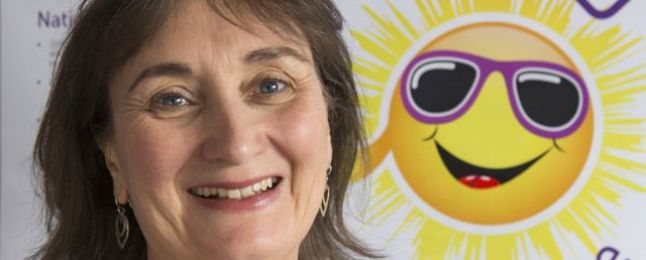
29th April 2015. CSH Surrey’s 0-19 nursing team will learn if it has won at a ceremony in the Savoy Hotel, London, on May 1. The Nurse of the Year 2015 will also be announced on the night, chosen from all the category winners.
The campaign - Vitamin D for You and Me - was launched in September 2014 and targeted pregnant mothers, children under five and at risk groups, such as those with darker skin tones or who spend little time outside, such as children with additional needs.
CSH Surrey’s 0-19 team, led by nurse, health visitor and professional practice teacher Pauline Bigwood wanted to implement Department of Health (DH) recommendations for vitamin D supplementation in these groups to improve child health.
The cornerstone of the initiative is a new pathway tool for professionals.
‘The evidence is very clear that vitamin D is essential for healthy bone growth and children’s general development but the national evidence paints a picture of vitamin D deficiency,’ explains Pauline, who is also a fellow of the Institute of Health Visiting. ‘It is clear that we need to initiate change.’
Pauline says that the recommendations for vitamin D can seem unclear and even professionals can be confused. She also felt that her team was in the ideal position to engage mothers and motivate change in vitamin D supplementation: ‘As nurses, the team meets breastfeeding mothers to support early intervention every day in our working lives.
‘Conversations need to be made at every appointment or contact with pregnant woman and mothers of young children. We need to capture children moving to fresh milk and reduce the number of children not having the vitamin D supplementation they need at two years.’
There was no national campaign to tweak and deliver so Pauline decided to design her own and inspire her team to get behind it. Simplicity was key – and Pauline started off with a budget of just £350.
‘To improve health outcomes we need as a profession to deliver evidence based practice confidently,’ says Pauline, ‘so we are using an innovative pathway tool developed with our paediatric dieticians to empower our team to deliver consistent, evidence-based information at every appropriate client contact.’
As well as a campaign poster, staff have an 'Ask me about vitamin D' badge to wear when working with families and a badge designed for children promotes discussion with their parents.
The information provided in CSH Surrey’s website was also improved and now includes all campaign materials to encourage its use as a resource for both parents and professionals.
The team designed information labels summarising DH guidance to stick inside personal child health records - the child’s ‘red book’. ‘It is offered following discussions with parents at 28 week antenatal contacts, new birth visits, and at one year and 27-month reviews.’
To maximise the campaign’s reach and influence, Pauline and her team involved and worked collaboratively with partner agencies and primary care, including children's centres, GPs and acute paediatric teams. ‘Any good campaign needs partners,’ Pauline points out. She also involved hospital and community midwives.
As she has become aware of other needs and knowledge gaps, Pauline has delivered further training, running awareness and education events for health professionals both internally and externally. And her team takes its message out into the community and professional practice events and promoted the initiative via traditional and social media.
‘We have taken our poster to conferences but we knew we had to get into the heart of our community to make a difference,’ says Pauline. ‘We have a pop-up campaign and will take it anywhere to get our message heard. We have been to children centre events, and more than 200 families attended our stall to get advice from our team of health visitors, school nurses, dieticians and community nursery nurses at the Surrey Big Fun Day.’
The campaign has undoubtably been a success. The team used a questionnaire before its launch to determine current levels of awareness of DH recommendations, supplementation and the likelihood of future use. The results showed 72% of parents/carers were likely to start supplementation following a vitamin D discussion.
The results of an evaluation in March to capture the impact of the campaign’s first six months are not yet available, but early figures show a rise in parents’ awareness of the need for vitamin D supplementation compared with the pre-campaign audit.
CSH Surrey chief executive Jo Pritchard, herself a health visitor, calls the campaign ‘public health promotion at its best’. She adds: ‘I am really proud of the way our children’s nurses and therapists have worked together on this eye-catching campaign, and am thrilled their hard work to improve the health of local children and families is being nationally recognised by the Nurse Awards in this way.’
The Nurse Awards judges agreed. They thought the campaign was an inspiring, bottom-up initiative delivered from the front line to meet an identified need. They praised Pauline for finding the funding, achieving such an impressive campaign with so few resources and thought it was transferable to other specialties.
Chief nursing officer for Wales Jean White added that Pauline is ‘a passionate leader, going out there and making a difference’. North Hampshire Clinical Commissioning Group chief nurse Jan Baptiste-Grant agreed: ‘Pauline showed huge leadership skills and huge passion and knowledge. She is a role model.’